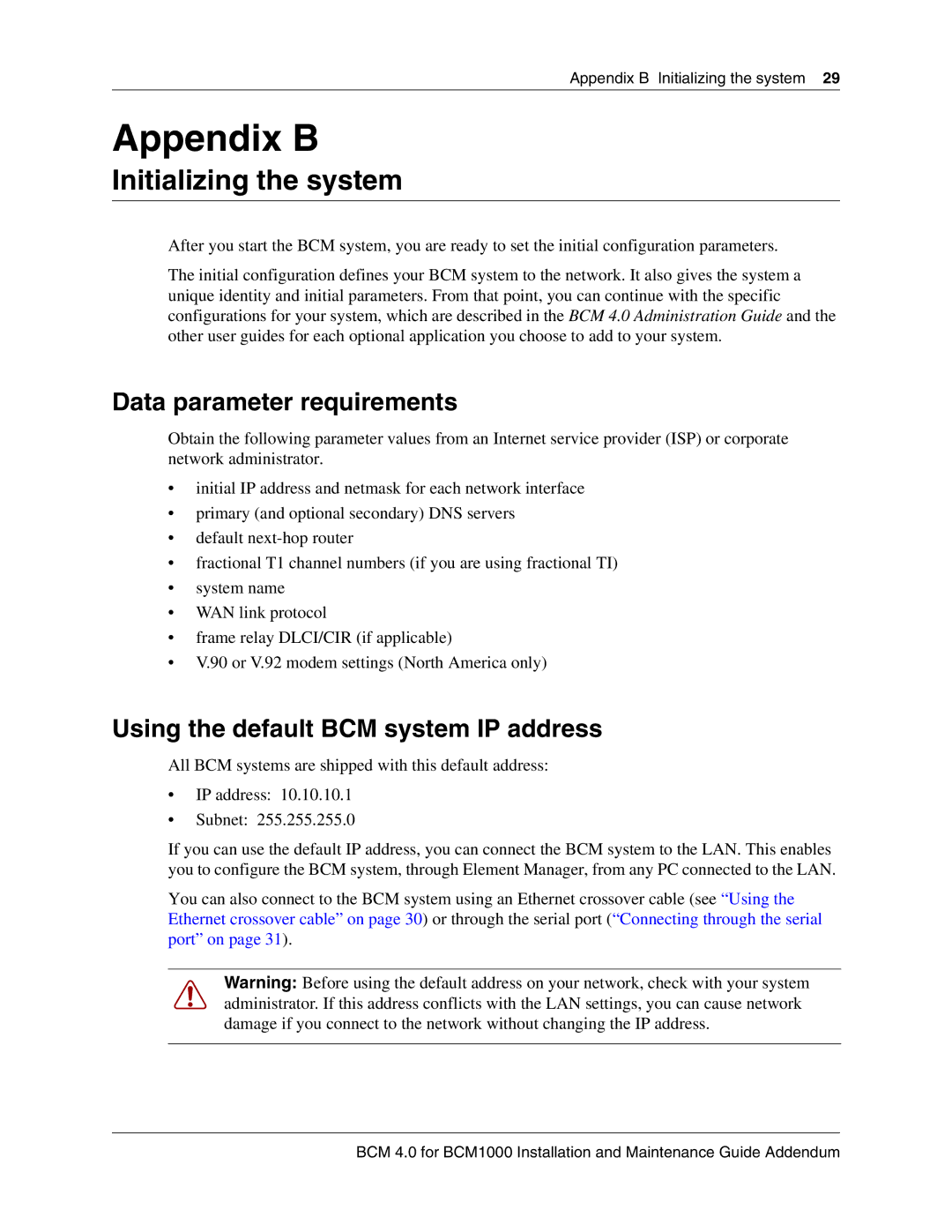BCM
Copyright 2006 Nortel Networks, All Rights Reserved
Software License
N0060603
Contents
Appendix C Configuring the BCM system
Appendix F Completing the initial installation optional
Contents N0060603
Chapter
How to use this addendum
About this document
What’s new in BCM
About this document
General changes
Documentation updates for BCM
3, Preface
22, Data networking components
44, Analog station modules and analog devices
Documentation updates for BCM
33, , Telephony hardware
55, , Auxiliary equipment
52, Legacy mobility equipment
69, Environment checklist
64, Setting offsets
64, Explaining double density
70, Electrical requirements
110, Shutting down the system
Documentation updates for BCM 4.0
Performing a system shutdown
To shut down the system software
Pages 131, Entering the software keycodes
Pages 126-131, Setting initial system configurations
Pages 144-146, Telephone port and DN cross-reference
To shutdown the system hardware
171, Software restart
Pages 160-161, New chapters
182, Initializing the hard disk single-disk system BCM
To initialize the hard disk in a single disk configuration
196, Controlling and monitoring mirroring operations
Initializing the hard disk
Tab Field Functions Description
Disk mirroring settings
229, Determining the status of a telephone
233, Appendix A, Defining region-based defaults
230, Moving telephones
254, Set DNs and port numbers
Getting started
Appendix a
About this guide
Audience
Acronym Description
Appendix a Getting started Acronyms Sheet 2
Appendix a Getting started Acronyms Sheet 3
Symbols and conventions used in this guide
Convention Example Used for
Appendix a Getting started
Technical Documents
Related publications
Call Pilot
How to get help
Getting Help through a Nortel distributor or reseller
Appendix a Getting started N0060603
Appendix B
Using the default BCM system IP address
Initializing the system
Data parameter requirements
Setting the crossover connections
Using the Ethernet crossover cable
Connecting through Ethernet crossover cable
To connect the Ethernet crossover cable
To configure your computer
Connecting through the serial port
To display the configuration menus
Null modem cable setup
Pin Signal
Serial port pinout
Configuration main menu screen appears. Refer to Figure
Next step
Regenerating a keycode after system replacement
Software keycode
Appendix C
Configuring the BCM system
Appendix C Configuring the BCM system
Initial parameters
Initial parameters overview
Startup parameters
Startup parameters overview
Appendix C Configuring the BCM system N0060603
Appendix D
Using Telset Administration to set the basic parameters
To enter the keycodes
Configuring the initial parameters
To configure the IP address
To select the region
To configure the modem
To create Telset user accounts
To select the telephony startup template and start DN
To initialize voice mail
Next step
Page
Appendix E
Using Element Manager to set the basic parameters
To access the BCM web
Accessing the BCM system
To download and install Element Manager
Prerequisites
To enter a keycode
To connect to the BCM system
Attribute Description
To configure the LAN IP address
Modify IP Settings attributes
Quick Install Wizard attributes
To configure the startup template for telephony services
Cold Reset Telephony attributes
To enter a name for your system
Configuring the startup parameters
To configure the date and time settings
Date and Time attributes
To configure Dhcp server settings
Subnets General Settings attributes Sheet 1
Dhcp server IP Terminal Dhcp Options attributes
To configure IP Phones
IP Terminal Global Settings attributes
To configure Snmp settings
To configure the Snmp manager list
To configure Snmp community strings
Modify Snmp Settings attributes
Add Community String attributes
Add Account attributes
To create user accounts
Page
Appendix F
Completing the initial installation optional
Appendix F Completing the initial installation optional
To configure the MBM
Configuring the media bay module
Checking for software updates
Configuring modem settings
Configuring voice mail
Performing a backup
Appendix F Completing the initial installation optional
Market profile attributes
Appendix G
Media bay module availability
Media bay module availability by market profile Sheet 1
Canada Caribbean Denmark
FEM MBM-Norstar trunk cartridge combinations
Analog trunk card
Time and date format based on language
Time zones and language information
Appendix G Market profile attributes
Language support for South America and Central America
Time/date formats based on language
South/Central America language support
Market profile Functionality Attribute Australia Brazil
Core parameters for market profiles
Caller ID display formats
N0060603
Cala
Vicap
PBX
N0060603
PRC
Mcdn 4ESS
PRC
Vicap
ITU-T
N0060603
Vicap
Pulse Dialing ms
Global analog trunk parameters
Transmission parameters
Market Start Digit Line Voltage Stutter Profile
On-hook caller ID Disconnect supervision Message waiting
Stop Digit
Busy tone Reversal
Transmission
GASM8 parameters
Input
Impedance Gain Scheme
EIA/TIA-464A
Dial pulse Min/max Min interdigit Coding Break
Dial pulse and Dtmf parameters
Dial pulse
Isdn line services
Isdn line services
Isdn services by protocol
Protocol Market profile Available Isdn services
Trunk types Description Digital trunk types
Analog and digital trunk types
Analog and digital trunk types and descriptions Sheet 1
Analog trunk types
Trunk types Description

